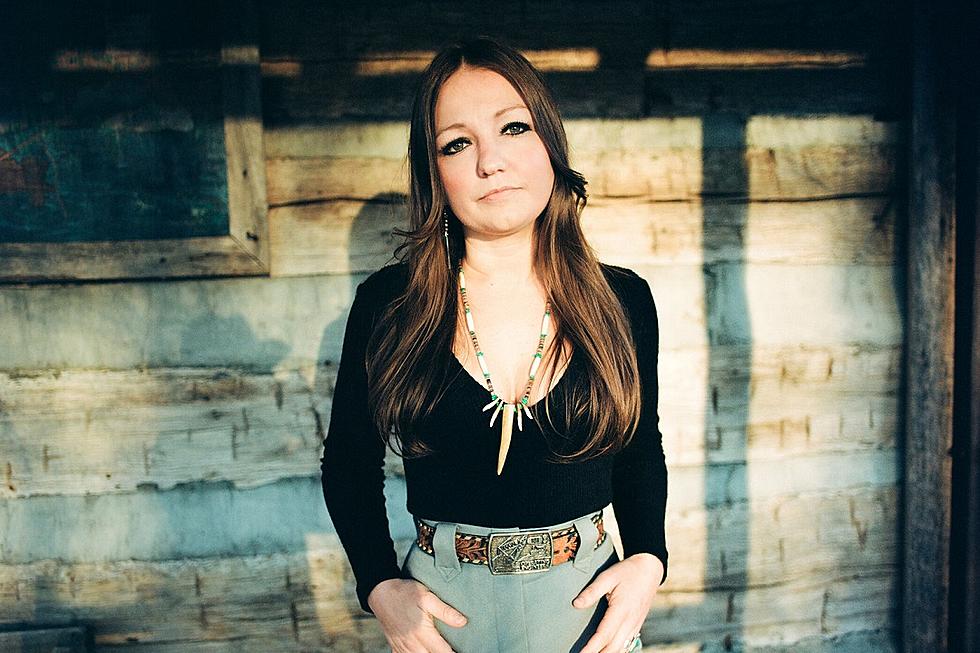
Interview: Kelsey Waldon Speaks Up on New Album, ‘White Noise / White Lines’
"Only here for a moment, then we're gone," Kelsey Waldon croons in the title track of her new record, White Noise / White Lines. The singer-songwriter confronts large quandaries of the human condition while paying homage to her strong roots on her third album, released on Friday (Oct. 4). Like any great songwriter, vulnerability and confidence are interchangeable on this LP, made of truthful songs that hit right at home.
The Monkey’s Eyebrow, Ky., native has spent nearly a decade making music in Nashville and playing it on the road. After releasing The Goldmine (2014) and I've Got a Way (2016) independently, John Prine’s Oh Boy Records ushered Waldon in as their first signee in 15 years. That support team has made all the difference this time around.
“They have been so selective about who they wanted to sign," Waldon tells The Boot over the phone, "so I guess in that aspect, it does feel very special."
Prine is someone Waldon has admired since a young age: His self-titled 1971 debut was one of the first albums she ever purchased on vinyl, when she was 16 years old. In 2017, at a tribute benefit held by Oh Boy for late Nashville rocker Jessi Zazu of Those Darlins, Fiona Prine, John’s wife and manager, approached Waldon to tell her they were big fans, promising to bring her on some shows. Waldon has opened for Prine on tour, and dueted with him on the Grand Ole Opry stage -- an experience she says will never get old.
“John is actually one of my heroes," Waldon says. "He has meant so much to me in my career, and my standard for writing songs, kind of who I wanted to be as an artist -- I mean, John is a huge part of that.”
It’s easy to see why Prine and company back Waldon: She's a songwriter's songwriter, and, for anyone who hasn't already caught on, White Noise / White Lines proves she has an important story to tell. It's traditional mountain music melded with longing Americana, carrying a spiritual wisdom rooted in realities both harsh and beautiful.
Songs such "Kentucky, 1988" serve as a perfect example of her keen sensibilities. The standout track is and an A+ country song telling the story of her childhood and family life with lines such as "Sunday school for your prayin' / Rotgut for your pain."
"I felt like I never really had my "Coal Miner’s Daughter.' I didn’t have a song that was trying to let you know in three minutes about my upbringing," Waldon says. "["Kentucy, 1988"]'s kind of a definitive [song], like, 'This is [my story] from the beginning.'"
Waldon weaves in and out of narratives on the album through the main thread that is a strong sense of place for her native Kentucky. From the coal mining story in "Black Patch" to the interludes of voicemails and banjo picking, setting is accentuated throughout.
"I also feel like this is kind of like, 'Country girl’s been around the world a few times.’ There's a lot more experience, but it's still rooted somewhere, which will hopefully show all the layers of the person," Waldon says. "I feel like sometimes our region is misunderstood around the world as well, so it's also bringing light to that. It's all those values, but it's always evolving, even though I remain the same. I'm still that down-home girl, but I'm a whole lot of other things too."
"Sunday's Children" is the perfect example of those other layers coming into focus. Featuring a driving beat and heavy twang, it's a critical commentary on religion rooted in common sense derived by observation rather than judgment.
"I didn't mean to be preaching, if that's what it sounded like. I moreso sometimes have to write things just because I have to make sense of what's going on around me," Waldon says. "I have to get things off my chest or off my heart, literally before I go crazy.
"There’s so many good things about faith and religion, but also there’s so many bad things. I just think there’s a lot of lines we put up, too, sometimes because of our own beliefs," she adds. "We have to be very careful because we start thinking all these other people are different from us, and they’re not. That’s really what it’s preaching against ... any kind of self-righteous attitude that happens because of religion. It's really a message of love."
White Noise / White Lines is a culmination of experiences communicated eloquently in song. The ending track, a cover of "My Epitaph" by North Carolina mountain singer Ola Belle Reed, ties up the ends nicely by reiterating the importance of enjoying life. It's a full-circle record on which Waldon has the room and courage to say what she knows to be her truth.
"It’s real," Waldon says. "All reactions are welcome."
Who Is Kelsey Waldon? 5 Things You Need to Know
More From TheBoot









